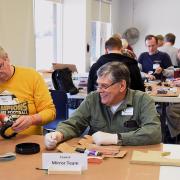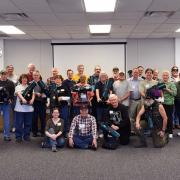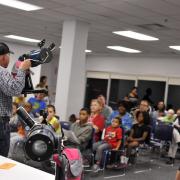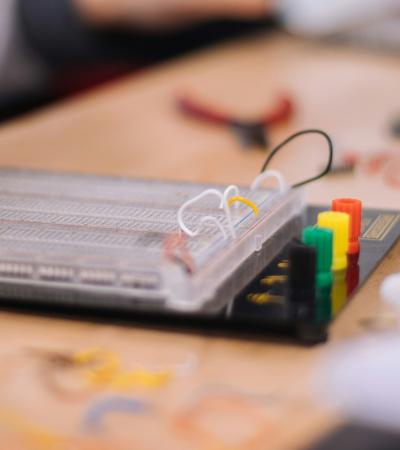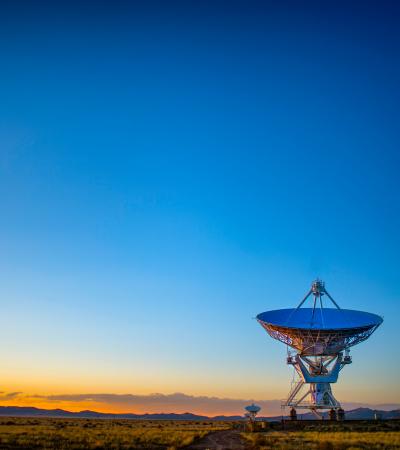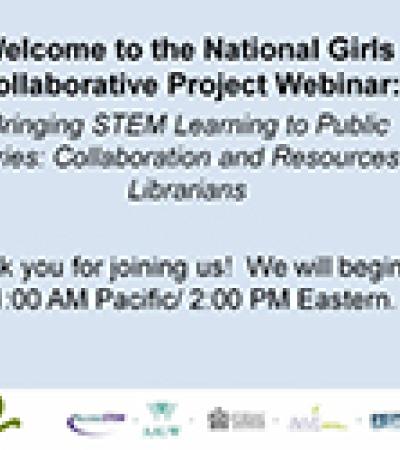The Telescope Lending Program is the result of a partnership between St. Louis County Library District (SLCL) and the St. Louis Astronomical Society (SLAS). The lending program makes 28 telescopes available for patrons to check out for one week; it is believed to be the largest telescope lending program at a single library district in the country. SLAS borrowed the concept from the New Hampshire Astronomical Society, which first introduced the lending model.
Telescope components are acquired and assembled by SLAS and provided to libraries at a cost of $335 per unit. SLCL acquired private funding to pay for the majority of the telescopes, but several others were donated directly by SLAS. The program has been extremely popular; since it was introduced in November 2014, we have had 475 checkouts and 522 holds (as of March 2016).
Advanced Planning
The SLCL had an interest in STEM programming for quite some time prior to being approached by SLAS with the telescope lending concept in September 2014. We discussed the model that was used by the New Hampshire Astronomical Society and how the project might work in St. Louis County. The shared goal between SLCL and SLAS was to increase knowledge, stimulate curiosity and encourage learning about astronomy through the use of telescopes.
SLAS identified the Orion StarBlast 4.5” telescope as the preferred model for its blend of performance, durability and affordability. These high-quality and portable telescopes made the program accessible to the entire community regardless of economic background or prior experience using telescopes. Several telescopes were donated by SLAS, and the remaining were purchased through a private donation at a cost of $335 per unit.
Because telescopes are outside the scope of items commonly loaned to patrons, the library established specific checkout procedures and circulation policies for the program. Once the telescopes were ready for deployment to the library branches, SLAS offered training so the staff at each library branch could effectively teach patrons how to handle and use the telescopes.
Marketing
In the initial rollout of the program, SLAS delivered a majority of the telescopes to SLCL branches, as well as a limited number to several smaller libraries in the area. All of the libraries involved in the project coordinated with SLAS to issue a joint press release. Several print publications picked up the story, and at least one radio station did an extensive interview and story about the project.
SLCL also relied heavily on its web and social media presence to launch the program. The first day the telescopes were available was a huge success as they were all checked out within minutes of opening at 9 a.m., and the waiting lists for the telescopes grew quickly.
Budgeting
The telescope components are all purchased by SLAS. The cost for the telescopes and the supplementary materials, including a red dot finder, a star guide, an Audubon guide, a headlamp, etc., are passed directly to the libraries that purchase the telescope units. The total costs are $335 per unit. SLAS works very hard to find the best pricing available for all components, and they buy and build the telescopes in larger batches to create an economy of scale. (View photos of the assembly process and volunteers under Photo Slideshow at right.)
Day-of-event Activity
The telescopes have been used in programming at Star Parties that are co-hosted by SLCL and SLAS. (View photos of and SLCL/SLAS star party under Photo Slideshow at right.) At a typical star party, SLAS volunteers bring a variety of telescopes, including some very large units, in addition to some of the telescopes from the lending. SLCL retains one of the telescopes exclusively for use at library programs, so it is often used at the Star Parties. SLAS volunteers show party attendees how to effectively use the telescopes and help them locate objects in the night sky. The volunteers also share knowledge about the different objects that are observed at the programs.
Program Execution
The majority of the library branches have scheduled at least one Star Party. Attendance at these events has ranged from 20 to 75 people. There are usually enough telescopes on site that all attendees are given a good opportunity to view objects. The feedback from patrons about the event has been very positive. Many children, and even adults, have had their interest in astronomy piqued by the experience.
In addition to hosting star parties, SLCL also hosted the latest Build Day at the Florissant Valley Branch on March 5, 2016. At this event, more than 30 volunteers from the community worked with SLAS coordinators to build 31 telescopes. The volunteers at Build Day go through a number of steps to make the telescopes more durable and less prone to damage or unwanted adjustments by library patrons.
Advice
Reach out to your local astronomical society and see if they would be interested in partnering with your library on this program. A great place to start is the Night Sky Network site (hosted by NASA’s Jet Propulsion Laboratory at the California Institute of Technology), where you can search for local astronomy societies and clubs based on your zip code.
Additionally, make sure library staff is well-trained on the units so they feel comfortable checking them out to patrons and answering any questions the patrons may have. It can be helpful to have a binder that staff can refer to, containing the procedures necessary to check the telescopes out and back in, as well as to provide answers to frequently asked questions.
As for storage of the units, create a safe place to store your telescopes (when they are not checked out or when they are on hold) so they do not get damaged. We store our telescopes in large rigid trash containers. If your library has multiple branches, we have found it easier to not transfer the telescopes between branches. Instead, instruct patrons that they must pick up and return the telescope to the same location.
Lastly, creating special programs revolving around the use of the telescopes helps educate patrons on how to effectively operate the telescopes, and will also inform patrons who were unaware that telescopes were even available for checkout.
Supporting Materials
- Feedback (Coming Soon!)
- Programming Librarian Facebook Group

